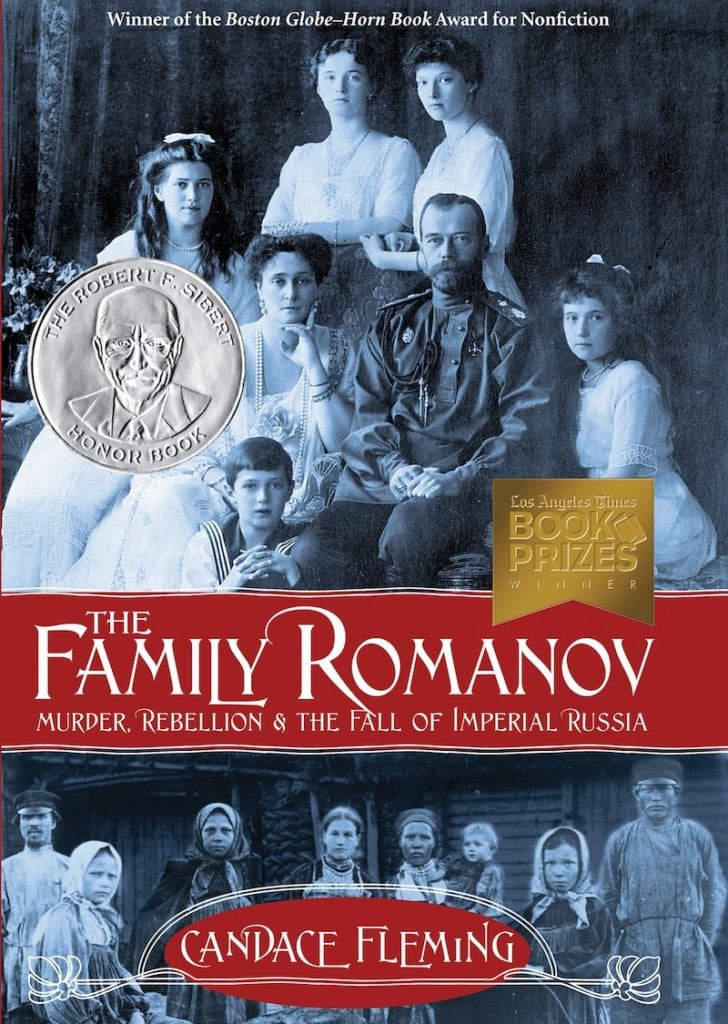 Today I welcome Candace Fleming to World Reads, a blog that features interviews with authors who’ve written a story set outside of the United States for children or young adults. Candy has published The Family Romanov: Murder, Rebellion and the Fall of Imperial Russia by Schwarz-Wade Random House which is YA nonfiction set in Russia for kids 12 and up.
Today I welcome Candace Fleming to World Reads, a blog that features interviews with authors who’ve written a story set outside of the United States for children or young adults. Candy has published The Family Romanov: Murder, Rebellion and the Fall of Imperial Russia by Schwarz-Wade Random House which is YA nonfiction set in Russia for kids 12 and up.
What is The Family Romanov about?
It’s the dramatic, suspenseful, but totally true story of the last tsar of Russia, Nicholas Romanov, and his family. There’s romance here, and intrigue. There’s crazy monks and revolutions and murders. And there’s love and family tenderness, cruelty and insanity. It really is a sweeping drama. One reader called it, “The Hunger Games except true.”
What inspired you to write The Family Romanov?
Teenagers, actually. Whenever I visit middle and high schools I talk about history, and how I spend years researching a life that utterly beguiles me. I always end my talk by asking if there’s any life from the past that the students would be willing to immerse themselves in. Invariably, a student – usually a girl – would raise her hand and say “Anastasia Romanov.” I’m not surprised. I, too, once believed in the bittersweet magic of Anastasia’s story – the rich, spirited princess who should have lived happily-ever-after but who was unable to escape her terrible fate. Doomed, her bloodline cursed, hers was a fairytale turned to tragedy. But the truth, as we all know, is no fairytale. What I began to realize was these teenagers who’d raised their hands realized they didn’t know the truth about Anastasia. How would they ever know it? I decided I needed to write that book for them… and myself.
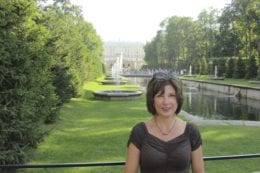 I remember being fascinated by Anastasia. My daughters were too. Smart that you ask your target audience what interests them. Are you connected to the setting of your story?
I remember being fascinated by Anastasia. My daughters were too. Smart that you ask your target audience what interests them. Are you connected to the setting of your story?
Russia? I’ve been twice – once when researching the book, and just recently to talk with Russian high schoolers about the book – and I do love the country. St. Petersburg is a gorgeous city, and Moscow is full of energy (and has some of the best restaurants in the world… seriously). Kazan, too, is extraordinary, and so different from those big cities. Traveling there, feeling the air and visiting the places the Romanovs lived and worked, really helped me understand their story. Russia is a character in the book. It’s the place the Romanovs profess to love. It’s the place the people desire to wrest away from them. Both find it worth fighting… and killing for. So yes, I do have a connection.
I was particularly impressed with the accuracy in your research of Russian history and loved the way you were able to weave in a fresh perspective through the eyes of the Russian people. I imagine you had to do a lot of research. Could you describe your process of doing research and how you were able to make sense of the information to write about the Romanov family in such a way that draws kids in and makes it fun to learn about history? Did you travel to Russia to do research?
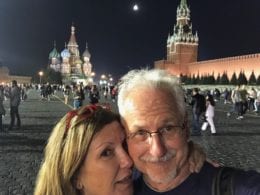 Let me warn you, it’s an involved answer. Ready? Brace yourself because here goes: My research follows four distinct paths. The first path is primary research. After all, the heart of all research is the firsthand accounts and eyewitness testimonies of those who lived through an historical event. And so I read reminiscences written by the children’s’ tutors, by Alexandra’s ladies-in-waiting and by Nicholas’ courtiers. I delved into the royal family’s letters and diaries and other personal papers. I read Yakov Yurovsky’s chilling account of the murders; statements from the guards; depositions from the priests and cleaning women who visited the Romanovs in their last hours. All of it was so personal, so intimate. If you think about it, primary research really is the height of nosiness… and probably the reason I love it so much. I get to be part detective, piecing together testimony from all that conflicting testimony; part gossip, reporting on all the juicy details I uncover.
Let me warn you, it’s an involved answer. Ready? Brace yourself because here goes: My research follows four distinct paths. The first path is primary research. After all, the heart of all research is the firsthand accounts and eyewitness testimonies of those who lived through an historical event. And so I read reminiscences written by the children’s’ tutors, by Alexandra’s ladies-in-waiting and by Nicholas’ courtiers. I delved into the royal family’s letters and diaries and other personal papers. I read Yakov Yurovsky’s chilling account of the murders; statements from the guards; depositions from the priests and cleaning women who visited the Romanovs in their last hours. All of it was so personal, so intimate. If you think about it, primary research really is the height of nosiness… and probably the reason I love it so much. I get to be part detective, piecing together testimony from all that conflicting testimony; part gossip, reporting on all the juicy details I uncover.
My second path leads me to secondary source material. There are hundreds of books about the Romanovs and the Russian Revolution (although almost none for young readers). Dozens of scholars have made the rigorous examination of Russia’s past their life’s work. They’ve written insightful, enlightening histories. I read dozens of these. For months every night I curled up with books with titles like The Russian Revolution of February 1917 or The Fall of the Romanovs. There’s no denying that my book stands on the shoulders of these works.
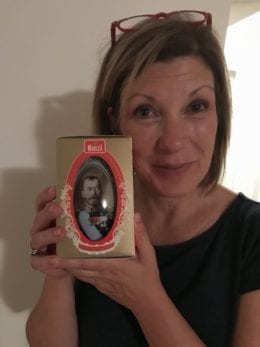 My third research path take me to experts – scholars, historians, and other writers. Experts, I’ve learned, are incredibly generous. All my nonfiction titles have been immeasurably improved by their time and effort. But no one was more helpful than Dr. Mark Steinberg, professor or Russian, East European and Eurasian studies at the University of Illinois at Champaign-Urbana. In the course of my own research, I’d come to rely on Dr. Steinberg’s work – his accessible histories of Russia, his impeccable translations of documents recently released from the Russian archives, his re-examination of Nicholas’ leadership abilities, his new and brilliant scholarship on Lenin. Can you tell I’m a fan? So as the first draft of the book neared completion I approached him tentatively. More than anything, I wanted him to read what I’d written. I wanted his opinion and knowledge. I wrote him, explaining my purpose and my readership. Then I crossed my fingers and hoped he’d answer. He did… enthusiastically. Over the course of the next six months, he read my draft, made suggestions, pointed out errors, suggested more appropriate source material and forced me to look at the evidence in different ways. He sent along books and articles he believed would help in my work. He re-read portions of the book I’d reworked based on his comments, and patiently answered what must have felt like a tireless stream of questions throughout the entire publication process. That’s generosity!
My third research path take me to experts – scholars, historians, and other writers. Experts, I’ve learned, are incredibly generous. All my nonfiction titles have been immeasurably improved by their time and effort. But no one was more helpful than Dr. Mark Steinberg, professor or Russian, East European and Eurasian studies at the University of Illinois at Champaign-Urbana. In the course of my own research, I’d come to rely on Dr. Steinberg’s work – his accessible histories of Russia, his impeccable translations of documents recently released from the Russian archives, his re-examination of Nicholas’ leadership abilities, his new and brilliant scholarship on Lenin. Can you tell I’m a fan? So as the first draft of the book neared completion I approached him tentatively. More than anything, I wanted him to read what I’d written. I wanted his opinion and knowledge. I wrote him, explaining my purpose and my readership. Then I crossed my fingers and hoped he’d answer. He did… enthusiastically. Over the course of the next six months, he read my draft, made suggestions, pointed out errors, suggested more appropriate source material and forced me to look at the evidence in different ways. He sent along books and articles he believed would help in my work. He re-read portions of the book I’d reworked based on his comments, and patiently answered what must have felt like a tireless stream of questions throughout the entire publication process. That’s generosity!
Last, but certainly not least, my fourth path takes me traveling. It’s important, I think, to visit the places where the story happened. Landscapes speak and houses hold memories and secrets. This was especially true when writing The Family Romanov. Not only was visiting Russia the best part of the research process, but it also contributed volumes to my understanding of the story. Just walking around and feeling St. Petersburg’s air brought the family closer to me. At Tsarskoe Selo, I wandered down shaded lands and through lush gardens. I didn’t just learn how the place looked. I discovered how fragrant the lilacs are after a rain shower, and how the ornamental bridge creaks when you cross it. I discovered how vast and empty the place is. Most of all, I discovered this – in none of my sources had anyone mentioned how close the family’s palace sat to the front gate. I’d assumed it was somewhere in the middle of the park, away from prying eyes. Not so. The tall, main gate with its golden, double headed eagle opens directly onto the palace’s circular driveway. Every day the family could look through its iron grillwork to the town of Tsarskoe Selo just on the other side. It gave me pause. The family was so close to it’s people. They were right there, just on the other side of the gate. The Romanovs could look out their windows and see them. They could hear their people’s voices from the palace balcony. They could smell their cooking and their livestock. They really weren’t as physically removed from the people as sources led me to believe. It gave me pause. Why, I wondered, didn’t the Romanovs feel more attachment to their subjects? The question led me down entirely new paths of thought. And it eventually led to the book’s inclusion of first hand worker and peasant accounts under the title, “Beyond the Palace Gates.”
Thank you for taking time to share your research process. What was the biggest challenge you had writing The Family Romanov? How did you overcome it?
The Russian language was the toughest challenge. Luckily for me, the Romanovs wrote to each other in English. But most of the other documents and memoirs are written in Cyrillic so I had to depend on other people’s translations. Six or seven different translators have translated some of those primary sources six or seven different times. It was typical for me to sit with all those version spread out around my desk, trying to figure out who’s version was the most understandable, or made sense, or was just the pithiest and most readable. Confusion reigned.
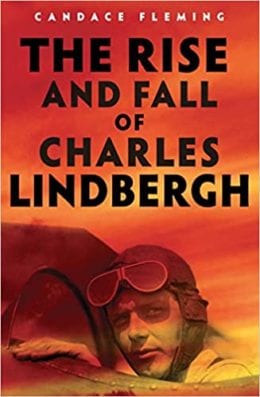 What kind of story can we expect next from you? Is it set outside of the United States? If so, where? And what is it about?
What kind of story can we expect next from you? Is it set outside of the United States? If so, where? And what is it about?
My newest piece of YA nonfiction came out in February. It’s called The Rise and Fall of Charles Lindbergh, and I’m thrilled to say, its received SIX STARRED REVIEWS! Whoop! While it’s definitely an American story, like the Romanov’s, it’s a sweeping one. We travel with the Lindberghs around the world, and across war-torn Europe. The book is part adventure story, part detective novel, part romance and part… well… a story about politics gone awry. There are Nazis and kidnappers and the crazy discovery after Lindbergh’s death that he had not one… not two… but three secret families and a passel of secret kids. It really is an edge-of-your-seat piece of nonfiction. It even starts with an arm being chopped off. How great is that?
I’m sold! I just ordered a copy of your Lindbergh book. Is there anything else would you like us to know about you or The Family Romanov?
I think I’ve probably babbled on enough.
I wouldn’t call it babbling. All of it is fascinating. Can you remember the first book set outside of the United States that made an impact on you? And why?
That’s probably The Secret Garden. I read it in third grade. I’ve been hooked on stories that take place in either Britain or India ever since.
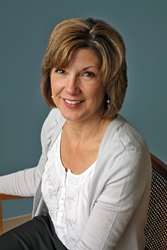 What advice would you give aspiring writers?
What advice would you give aspiring writers?
Read voraciously, and write something every day.
If you’re a fan of history and good writing, I highly recommend reading The Family Romanov: Murder, Rebellion, and the Fall of Imperial Russia. I’ve spent a good fifteen years plus working in the former Soviet Union and have read many adult books on the Romanovs and Russian history and this one is my favorite. If you’d like to learn more about Candace Fleming, please visit her website or follow her on Facebook, Twitter and Instagram.
Thank you, Candace Fleming for joining us at World Reads! I’m a huge fan of your writing and look forward to seeing more of your books.


